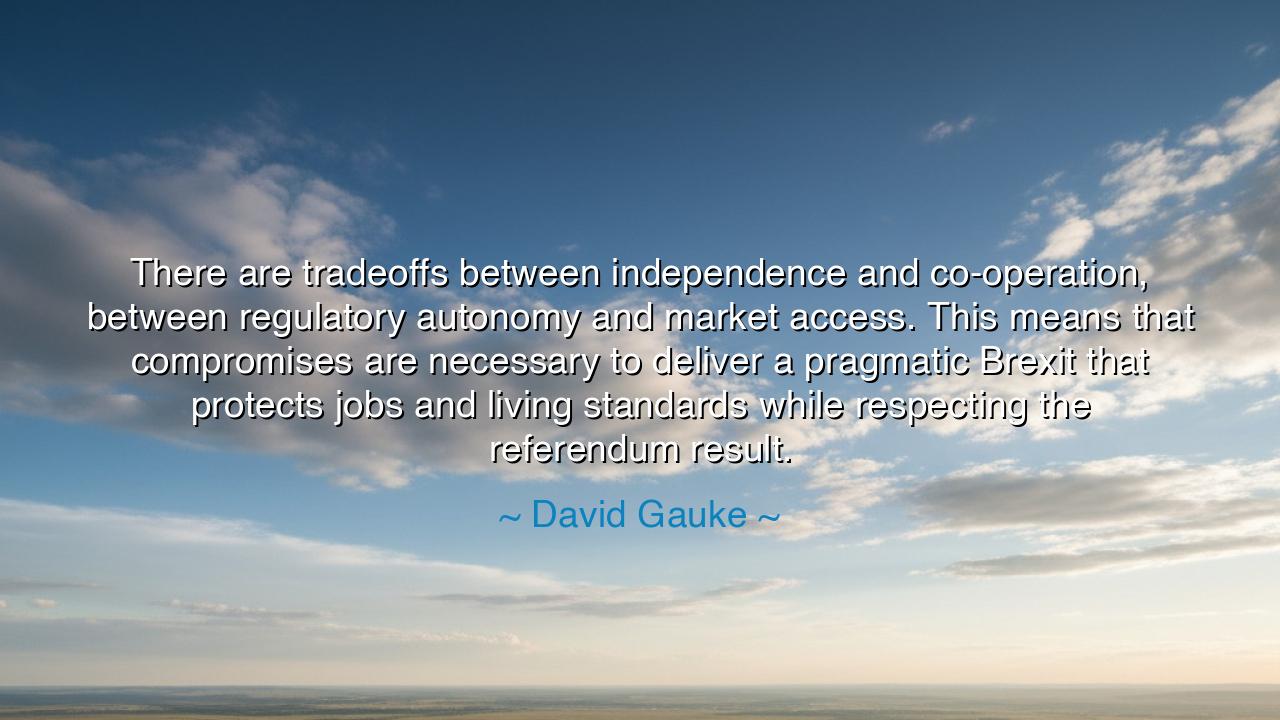
There are tradeoffs between independence and co-operation
There are tradeoffs between independence and co-operation, between regulatory autonomy and market access. This means that compromises are necessary to deliver a pragmatic Brexit that protects jobs and living standards while respecting the referendum result.






The statesman David Gauke, speaking in the shadow of one of Britain’s most turbulent political ages, once said: “There are tradeoffs between independence and co-operation, between regulatory autonomy and market access. This means that compromises are necessary to deliver a pragmatic Brexit that protects jobs and living standards while respecting the referendum result.” In these words lies not merely the language of politics, but the eternal truth of governance and of life itself — that freedom and co-operation are twin forces in constant tension, and that the art of leadership lies not in denying this tension, but in balancing it with wisdom. Gauke’s reflection was born amid division, yet it carries the calm of reason: that independence without prudence becomes isolation, and that compromise, far from weakness, can be the highest expression of strength.
To understand the heart of this quote, one must look back to its origin — to the years following the Brexit referendum of 2016, when the United Kingdom stood at a crossroads between sovereignty and interdependence. The nation had chosen to leave the European Union, to reclaim control of its laws and borders, but it faced the daunting question of how to do so without tearing apart the economic and social fabric that bound it to its neighbors. Gauke, then a minister of state, sought to remind his peers and his people that freedom carries a price — that to stand alone requires sacrifice, and that no nation, however proud, can escape the web of mutual dependence that defines the modern world.
This truth is as old as civilization itself. From the time of Athens and Sparta, to the alliances and rivalries of kingdoms and empires, mankind has wrestled with the balance between autonomy and unity. The city that sought total independence risked becoming weak and poor; the one that surrendered too much sovereignty risked losing its soul. Even the Roman Empire, vast and mighty, thrived only when it learned to weave cooperation among the diverse peoples it governed. When pride blinded Rome to this necessity, division and decay followed. Gauke’s warning, though spoken in the language of policy, thus carries the same ancient wisdom: that in the pursuit of independence, one must never sever the ties that sustain life itself.
The tradeoffs Gauke mentions are not burdens, but truths to be acknowledged. To enjoy regulatory autonomy, a nation may gain the freedom to set its own course — but in doing so, it risks losing market access, the ability to trade freely and prosperously with others. Likewise, co-operation brings prosperity and peace, but it also demands humility, the willingness to yield some control for the greater good. This is the paradox that all wise leaders must face: that no choice grants all things, and that compromise, properly understood, is not the betrayal of ideals but their preservation in the face of reality.
Consider the example of the founding of the United States, born of revolution against tyranny, yet tempered by the wisdom of union. After breaking free from British rule, the thirteen colonies discovered that freedom alone could not feed or protect them. The Articles of Confederation, granting each state near-total independence, led to chaos and weakness. Only when the founders — men like Madison, Hamilton, and Washington — came together to forge the Constitution, built upon compromise between large and small states, between federal power and state autonomy, did the new nation truly endure. Thus, even the freest of nations learned that independence must be balanced by shared purpose, lest liberty devour itself.
In Gauke’s plea for a pragmatic Brexit, we hear the echo of this same understanding. He does not scorn the desire for independence, for it is the heartbeat of any proud people. But he reminds us that pride without prudence leads to ruin. The wise builder does not tear down his old house before ensuring that the new one can shelter him; the wise sailor does not cast off into open seas without provisions. True independence, he teaches, is not the rejection of all ties, but the mastery of them — the ability to engage with the world from a position of confidence, not fear.
The lesson of his words, then, extends beyond politics into the realm of life itself. Each person, like each nation, must navigate the balance between self-reliance and cooperation. To be wholly independent is to risk loneliness and hardship; to rely too much on others is to lose the strength of one’s own will. The art of living — like the art of statecraft — lies in the wise compromise between the two. When facing conflict, seek not total victory, but lasting harmony. When seeking freedom, remember the value of fellowship.
So let us take from Gauke’s reflection a timeless teaching: that true wisdom lies not in extremes, but in balance. Independence is noble; co-operation is necessary. One without the other is weakness disguised as strength. Whether as individuals, communities, or nations, we must learn to build bridges even as we guard our borders, to honor both liberty and unity as the twin pillars of civilization. For in that balance — difficult, delicate, but enduring — lies the secret of peace, prosperity, and the survival of every generation that dares to dream of freedom.






AAdministratorAdministrator
Welcome, honored guests. Please leave a comment, we will respond soon